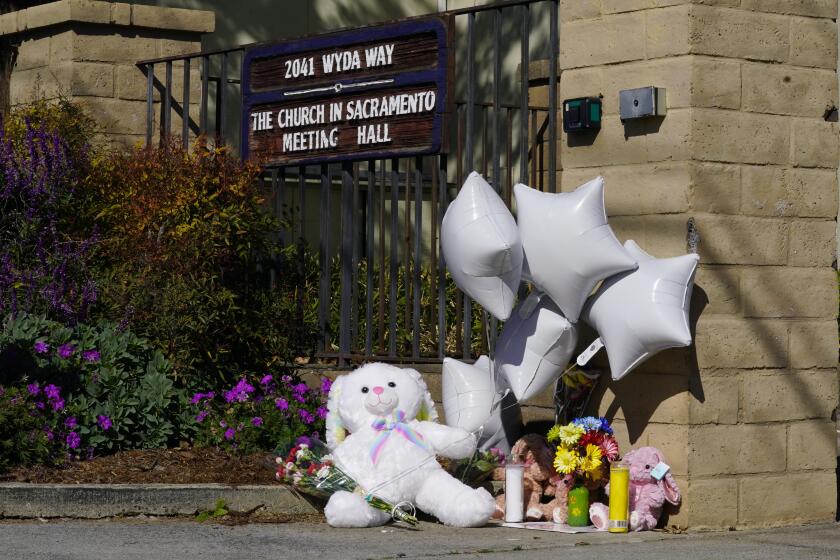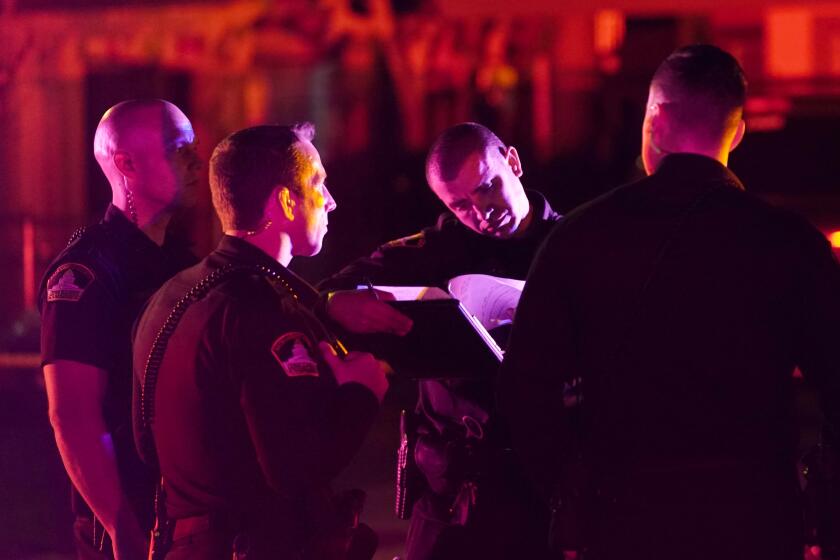California has the toughest gun laws in the U.S. That’s irrelevant if they’re not enforced

- Share via
SACRAMENTO — How much money are we willing to spend to seize guns from the likes of the disturbed father who shot and killed his three daughters in a church?
And are Sacramento Democrats now willing to retool California’s controversial sanctuary law after it probably protected the father living here illegally from federal immigration agents days before he killed his kids?
Putting a price tag on the lives of young girls is an impossible task. But the priority should be a lot higher than where we’re placing it now, despite all the rhetoric about the need for tight gun control.
California has the toughest state gun laws in the nation. But that’s irrelevant if they’re not adequately enforced — and they’re not.
“We need to enforce more of the laws that we have,” state Atty. Gen. Rob Bonta acknowledges. “The rise in violent crime throughout the country is almost entirely because of guns.”
In particular, he adds, “ghost guns are a new challenge we need to rise to.”
They’re unregistered guns that are assembled from purchased parts. It’s practically impossible to trace them to a violent owner so they can be seized.
You undoubtedly read the sad, unimaginable story about the father killing his children.
Turns out that 39-year-old David Mora was living in the country illegally and used an illegal ghost gun.
Mora was subject to a domestic violence restraining order that forbade him from going near his former girlfriend, Ileana Gutierrez Rios, the girls’ mother. In seeking the order last May, she warned a Sacramento court that he was dangerous and had threatened her and to kill himself.
Rios asked that he also be kept away from their kids. But the court bought Mora’s protest that he wanted “a healthy relationship” with his children. And he was granted weekly supervised visits with the girls.
On Feb. 28, Mora and his daughters were visiting in a Sacramento church when he opened fire with a ghost AR-15-style assault rifle. It was equipped with an illegal high-capacity 30-round magazine. In all, 17 shots were fired, killing the girls, ages 9, 11 and 13, and the chaperone, a mutual friend of Mora and Rios.
How could an unstable man under a restraining order obtain an AR-15-style rifle, walk into a Sacramento-area church and then kill his three daughters and a family friend?
Mora killed himself with the 17th shot.
Under the restraining order, Mora wasn’t allowed to legally possess a gun. But apparently neither the court nor law enforcement knew he had one. His abused former girlfriend apparently wasn’t aware he did. And possibly he didn’t obtain it until recently, after being released from the Merced County Jail, where he’d been held for one night.
Five days before the Sacramento shooting, Mora was arrested near Los Banos on suspicion of drunk driving and assaulting a California Highway Patrol officer. He also was booked for attacking a hospital emergency room technician.
Federal immigration agents tried to detain Mora. But because of California’s sanctuary law, “the jail was unable to hold him or communicate with ICE about his release and he walked out” on $15,000 bail, the investigating Sacramento County Sheriff’s Office reported Friday.
“This unspeakable tragedy highlights the true cost, unintended or not, of sanctuary policies that prevent law enforcement from protecting its citizens,” said Sacramento County Sheriff Scott Jones, who’s running for Congress as a Republican.
The sheriff’s sweeping statement is arguable.
There was a last-minute compromise forced by Gov. Jerry Brown on the sanctuary bill before it passed the Legislature in 2017. The measure, by then-Senate leader Kevin de León — now a Los Angeles City Council member and mayoral candidate — denied California help to federal agents trying to deport people who came here illegally but, like most, are staying out of trouble. The compromise meant ratting out bad guys to the feds.
Leave the good ones alone and kick out the bums. Around 800 crimes were listed as qualifiers for bum status.
But if Mora did not meet the criteria for being turned over to customs agents, then the sanctuary law should be toughened up. He clearly should have been deported.
There’s a lot about this mass shooting we still don’t know.
Woman told court her boyfriend was dangerous before he killed 4 during a supervised visit with their children at a Sacramento-area church.
How did Mora get the gun? Did he buy it off the street? Make it himself? Was it stolen? Did anyone know he had it?
Law enforcement must not have known, or it would have seized the weapon. You’d think.
There should be more thorough investigations with in-depth interviews of domestic violence victims when they seek restraining orders. And if the target is found to possess a firearm, confiscate it immediately. That would require more money.
The statewide data system is also decrepit and information about restraining orders isn’t circulated widely, if at all. Bonta wants money to beef it up.
There’s a gun violence restraining order that’s focused on firearms. It involves local “red flag” programs aimed at people judged by a court to be potential killers. Their weapons are confiscated immediately.
“Red flags are underutilized,” Bonta says.
There are about 24,000 Californians the attorney general’s office knows about who possess guns and legally shouldn’t. But it can’t recruit enough state officers to grab the weapons and make a dent in the list. The job is dangerous and the pay isn’t competitive.
“We have the most restrictive gun laws in the country,” says Sacramento County Dist. Atty. Anne Marie Schubert, who’s running for attorney general as an independent. “But you have to have the funding to take the guns off the street. There are ghost guns everywhere right now.”
There’s legislation aimed at tightening up the seemingly ineffective ghost gun ban.
Gov. Gavin Newsom projects a $21-billion discretionary state surplus for the next fiscal year. Take 1% of that and invest it in protecting young girls from their gun-toting fathers.
And help the feds deport the ones here illegally.
More to Read
Sign up for Essential California
The most important California stories and recommendations in your inbox every morning.
You may occasionally receive promotional content from the Los Angeles Times.
















